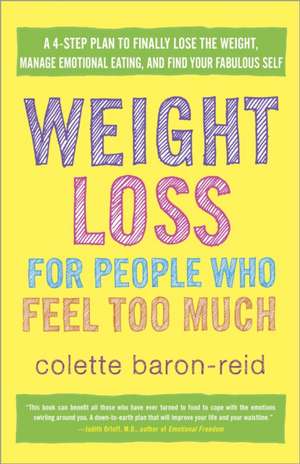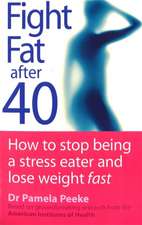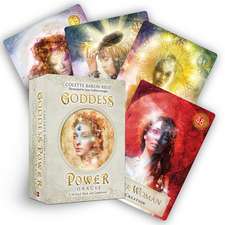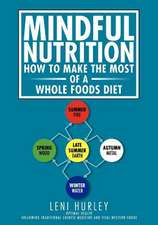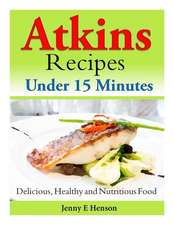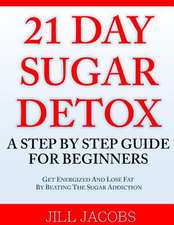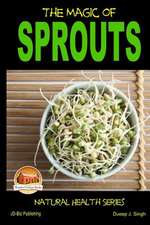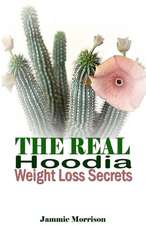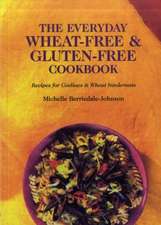Weight Loss for People Who Feel Too Much
Autor Colette Baron-Reiden Limba Engleză Paperback – 13 ian 2014
Through her own personal experience and work with thousands of clients, Colette Baron-Reid understands the real reason many of us struggle to lose weight and keep it off. It isn't that we don't know what to eat or that we don't have enough willpower; it's that we are responding to feeling too much.
Weight Loss for People Who Feel Too Much focuses on the keys to weight loss for sensitive people: managing empathy, setting and maintaining healthy boundaries, eating to support well-being, and dealing with challenging situations that can trigger disordered eating. With a simple, practical program, Colette shows you how to release the extra pounds and create a new, healthy relationship with your body, your weight, and food.
Preț: 102.40 lei
Nou
19.59€ • 20.46$ • 16.22£
Carte disponibilă
Livrare economică 15-29 martie
Specificații
ISBN-10: 0307986136
Pagini: 301
Dimensiuni: 130 x 201 x 18 mm
Greutate: 0.25 kg
Editura: HARMONY
Notă biografică
COLETTE BARON-REID is an internationally renowned intuitive counselor, life coach, and author. Through a 22-year practice, she has advised over 34,000 clients in 29 countries and for three years toured as the opening speaker with Hay House. Colette's Master Intuitive Coach Institute certifies others in her transformational coaching techniques. "The Colette Baron-Reid Show" airs twice weekly on CBS-owned New Sky Radio and she has appeared on The Dr. Phil Show, "Oprah and Friends" with Dr. Oz and "Coast To Coast," among others.
Extras
Feeling Too Much: The Hidden Thread
I don’t remember what was causing the tension to swirl through our house like the winds of autumn, sending emotional debris spinning through the air with such intensity that it seemed to smack up against me. What I do remember was what I felt like: confused and unsafe, as if the stories I could sense on the outside somehow got inside of me. I was helplessly floating in the chaos that surrounded and penetrated me. I was only four years old, but I remember the experience vividly.
I had to have relief. Make it stop! I had to close myself off, ground myself in my body, in Colette.
I knew just what to do. I picked up a cooking spoon that had sticky raw cake dough on it, and as soon as I put it in my mouth, I felt calm. Now, that feeling didn’t last, but it was very powerful. I had already discovered the connection between food and self-soothing. The fear melted away as the gooey, sweet mess on that spoon dissolved in my mouth and slid down my throat. I was “home,” in a safe place where that icky feeling of something being very wrong couldn’t get inside me again. That sense of physicality as the cake dough entered my body gave me a sense of substance. It made me feel whole, and secure.
It would be years before I understood this experience or its significance, but when I finally did, everything changed. I realized that the missing piece in the puzzle of my baffling relationship to food, eating, and weight was empathy. I was a person who felt too much, and I was using food to detour away from the awful feeling of not knowing where I ended and others began.
Food sealed my porous boundaries where other people’s energy invaded me, and it allowed me to feel present in myself. I needed that quiet and calm, but I had to find a better way to achieve it. This revelation ended an exhausting war with food and my weight and began a new chapter for me. While I’m not a size 2, and I can’t claim to have the figure of a 20-year-old high-fashion model, most of the time I’m at peace with my body and myself. That alone is an incredible feat, given how much I have struggled with all of this over the years.
It was this missing piece of feeling too much that allowed me to stop beating myself up (which, as it turns out, is counterproductive when trying to lose weight, as you’ll learn later in this book). Once I did that, I started to better understand the many influences on those formerly dysfunctional relationships between myself, food, and my body. I was able to address those influences, too—but it all began with understanding why I was feeling too much and why fear and frustration were making me fat.
Porous Boundaries
A person who feels too much often senses the need to eat because her experience of the world is too much for her. It’s not that she simply loves the taste, texture, smell, and sight of food, which provides a sensory experience. It’s not that she’s experiencing hunger pangs, or even that she’s addicted to food, although that may be. Diets don’t work for her because they don’t address her powerful need to feel grounded in herself, separated from the confusing, distressing emotional turbulence around her. Food serves that purpose.
The stress of remaining in the moment, without knowing what you are sensing and how to be separate from it, is deeply discombobulating for someone who feels too much. The pain and discomfort are intolerable, and you will do anything to escape.
If you’re highly sensitive and empathetic, that has a profound influence on your weight, as well as your thought processes and your moods, which affect your eating habits and your relationships with others. I’m sure you know all about emotional eating, but you’ve probably never considered what empathetic eating is, too. There is a subtle yet profound difference between the two. An example of emotional eating would be feeling so uncomfortable after a conflict with a coworker that you reach for the stash of mini candy bars you keep in your desk drawer to calm your anger and embarrassment.
However, let’s say that it’s not you who was in conflict with someone at work but two people in another department. You walk into the meeting room where they just had a heated argument and you feel the tension in the air. You’re unsettled and uncomfortable and have no clue why. As other coworkers file into the meeting room, you have a compelling urge to sneak back to your office and grab some candy bars. You start feeling defensive and on alert, and you can’t understand why. All you know is that you want those mini chocolates right now. That’s empathetic eating.
Emotional eating and empathetic eating often occur at the same time. Let’s say you’re about to leave for work and you’re feeling particularly vulnerable because you woke up, weighed yourself, and were embarrassed and ashamed by the number on the scale. You drive to work and feel frustrated, anxious, and angry that other cars aren’t allowing you to merge. Then you walk into the meeting room where tension hangs in the air and you suddenly realize there’s a ball of confusing emotions rolling around inside you and you have no idea how to sort it out. Visions of doughnuts dance in your head. Your emotions are difficult enough to deal with, but now you’ve taken on the emotions of others and added them to the mix. You’ve done this because you’re highly sensitive and empathetic, and other people’s emotions flood into you through your porous boundaries.
You probably don’t realize when you’re taking on someone else’s emotions that you’re experiencing feelings that aren’t yours. Thoughts don’t enter your mind when you’re deeply upset and feeling ungrounded. You just feel discombobulated, or upset. You can’t put your finger on what you’re really feeling. You don’t say, “Hey there, self. Bob’s anger has entered you and you’re tuned in to him!” All you know is that you have to have that salty, sugary, fatty treat now.
I know what this is like because I have felt this way with disturbing regularity: filled with confusing emotions that were upsetting me. I didn’t recognize that many of those feelings weren’t even mine. Why did it take me so long to figure this out? Why don’t diet books or courses teach us about how taking on other people’s “stuff” affects us? In our culture, we don’t talk much about empathy, so when you’re sitting there feeling guilty for downing a huge portion of junk food, you’re not likely to think about this whole “empathy” and “sensitivity” thing. But ah, if you did, what you would learn!
What It’s Like to Be Deeply Empathetic
Empathy is much underrated. From childhood, we learn that brute strength, toughness, and smarts are what we need to succeed and be happy in life. We rarely celebrate sensitivity, or the beauty of caring deeply. Too often, sensitivity is seen as a weakness, something to be ashamed of (and more so for men than for women, which is why sensitive men have it especially rough).
But being empathetic—feeling others’ emotions as your own—can give you a deeper understanding of others and greater compassion. If you’re highly sensitive and empathetic, your friends probably would say you’re the one person they can always count on to know they’re sad when they’re pretending everything is okay. You can probably sense feelings others don’t pick up on. That sensitivity enables you to “read” situations very well and respond accordingly. Your actions and decisions take into account the hidden reality of people’s emotions. You might find that people seem instinctively drawn to you, and random strangers may even tell you their troubles. I have a friend who is hopeless at directions, but whenever she’s in New York City, strangers push their way through crowds to ask her to point them to Broadway. She just gives off an approachable and kind energy—and then she has to admit that she has no idea whether she and the stranger are facing north, south, east, or west.
Your intuitiveness and sensitivity may make you an excellent healer, teacher, and counselor. You may play that role in your relationships—the “unpaid psychiatrist” of all your friends or the harmony establisher in your family. Or, you may actually work in the helping professions as a therapist, nurse, doctor, social worker, acupuncturist, executive assistant, or in human resources, and so on, or perhaps you work in a creative, artistic field. You probably see other people in shades of gray rather than black or white, and you don’t overidentify with one separate group. Ultimately, feeling “too much” can be quite an asset, personally and professionally. Take a minute to feel how wonderful that is.
And when you feel more intensely than others do, you can truly revel in shared experiences, like concerts, picnics, or spiritual gatherings. You don’t just have fun on these occasions. You feel sheer joy filling every pore in your body, and you soak in the pleasure of everyone around you. Heaven!
But let’s face it, there’s a down side, too. If you feel too much, even happy experiences can quickly make you feel overstimulated or hyper, which can trigger anxiety because that sense of excitement seems out of your control. You start feeling ungrounded and anxious, and begin looking for a sanctuary from all the hoopla. You have to develop coping mechanisms. It’s all too much.
You may even have begun early in life sensing the world too much as unsafe so you spend most of your life isolated from others. I know some empathetic people who completely numb out and shut down, unable to feel anything at all because it’s too scary. To heck with feelings—you might have even developed a very strong personality to ensure that you can control who connects with you and who doesn’t. And guess who needs to always be in control of that dial, more than likely on the “Don’t come near me unless I say how, when, and exactly for how long” setting? There’s a whole spectrum of coping mechanisms that people who feel too much engage in to avoid the onslaught of feelings picked up like lint floating through the emotional environment. You may cope by having your “radar” constantly on Alert to ensure that the vibes you pick up are turned right down or off, even if they are wonderful and meant to be comforting. Don’t hug me, don’t touch me, don’t stand so close to me! You’re not having any of that!
On top of that, the vibes you’re feeling aren’t always pleasant, anyway. People’s anger easily rattles you, even when it’s just a shouting match on a reality TV show. When someone is callous or insensitive, you feel uneasy. This is true even if the person’s behavior isn’t directed at you but, rather, at someone else. If you hear about people or animals suffering, you just can’t bear it. Grief or anger settles over you like a dark, heavy blanket and it dampens your mood for hours, even days.
Is it possible that loving and caring for others, being generous and openhearted, can make you fat? Consider: why are so many nurses overweight? As they take care of the sick, who is taking care of them? How are they processing what they see, experience, and feel all day long as they work their high-stress jobs? In his book Microtrends, Mark Penn points out that African-American women are three times as likely as any other subgroup of Americans to be overweight. The women most likely to be morbidly obese are the caregivers in their communities—the full-time grandmothers, the nurses and nurses’ aides, the church volunteers, and the teachers. Maybe it’s just a matter of eating too many fattening foods on the go, but maybe it’s also that these women are taking on the weight of their overburdened communities.
What if, instead of beating yourself up for being overweight, you appreciated your kindness, sensitivity, compassion, and generosity? What if you made a commitment to show yourself and your body the love you show to others? What if you came out of isolation and allowed yourself to feel? What if you stepped back from your emotions and your persistent inner critic, and instead told yourself, You are a treasure. I am so honored to know you, to actually be you.
Try it.
This is what you need to start doing. It may be uncomfortable at first, but with practice, you are going to become kinder to yourself. That alone will be a strong foundation for bringing your body back to its optimum health and weight. Love thyself. Love thy body. You will be amazed at how much power you have to change what you wish to change when you start with love.
So how did you get here? How did your empathy, and the other factors in your complex relationships with your body and your food, affect you?
A Life’s Tapestry: Finding Patterns in the Fabric of Your Reality
What if you could look at your life as if it were a giant tapestry, woven with brightly colored threads that tell the story of you? The fabric of your reality would be so easy to understand! Imagine that the threads going across represent your life experiences and the conditions of your life—your family, friends, opportunities. The way you respond to those conditions, with or without awareness, determine the vertical threads. Wouldn’t it be great to have such a tangible depiction of your life experiences? Then, it would be so easy to understand how you got from A to B in your story. You would be able to see all the repetitive patterns that have marked your life and could recognize their origins. Here is where this one begins, and here is where that one begins. Look there! That one stopped repeating. That pattern in the tapestry only happened once and never again.
Your issues with food and your body would show up in one or two obvious colors, which would make it easy to see the conditions that caused the pattern to repeat—and keep repeating. Then you would have a thread representing your feelings. It would be so easy to recognize how your emotions and your relationships to food and your body come together. This pattern might run continuously through the whole tapestry. The patterns would change according to your choices or would repeat when you didn’t, wouldn’t, or maybe couldn’t make a choice that might alter them. You could discover the conditions that trigger your issues by looking at the way the threads that represent them cause the pattern to shift. From that outside perspective, you could see what you couldn’t when you were inside the tapestry, aware of your experiences and emotions but unaware of the patterns they were weaving.
Descriere
From internationally renowned intuitive counselor, life coach, motivational speaker, and author Colette Baron-Reid, a four-step, eight-week program for managing empathy overload--the hidden cause of unwanted weight gain Through her own personal experience and work with thousands of clients, Colette Baron-Reid understands the real reason many of us struggle to lose weight and keep it off. It isn't that we don't know what to eat or that we don't have enough willpower; it's that we are responding to feeling too much.
Weight Loss for People Who Feel Too Much focuses on the keys to weight loss for sensitive people: managing empathy, setting and maintaining healthy boundaries, eating to support well-being, and dealing with challenging situations that can trigger disordered eating. With a simple, practical program, Colette shows you how to release the extra pounds and create a new, healthy relationship with your body, your weight, and food.
